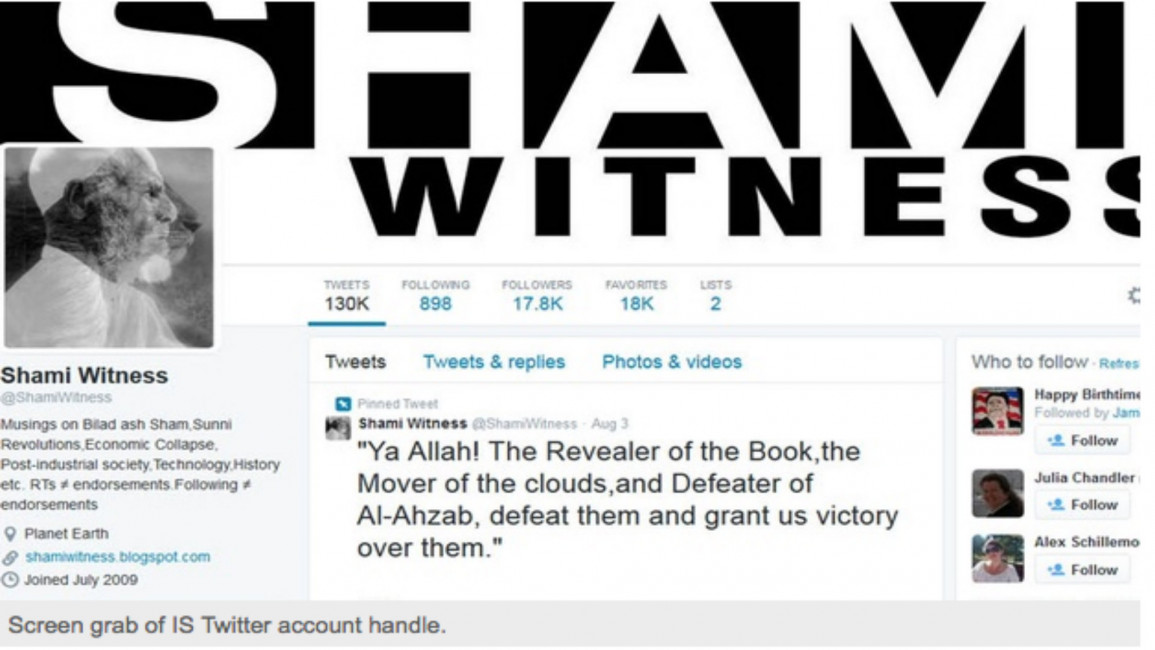Indian outed as Islamic State's top Twitter propagandist
Indian outed as Islamic State's top Twitter propagandist
@ShamiWitness was known as the inside authority on the Islamic State group. But the account holder has been revealed as a man from Bangalore named Biswas, with no experience of the Middle East.
3 min read
Being neither Shami nor a Witness did little to undermine @ShamiWitness' following
The man behind the most authoritative pro-Islamic State Twitter account has been outed as an Indian manufacturing executive with no first-hand experience of the Middle East.
Mehdi Biswas was arrested in Bangalore after being revealed as the man behind @ShamiWitness by the UK's Channel 4 News. The programme joined the dots by comparing details left on several social media accounts.
The revelation will shock many among his 18,000 followers - about two-thirds of foreign fighters in Iraq and Syria who use Twitter are believed to have followed him.
Biswas used the @ShamiWitness account to laud IS actions, promote its account of the war in Syria and Iraq and provide potential recruits with information on how to join. The video of the death of American aid worker Abdul Rahman Kassig was posted on the account five times.
Channel 4 News' initial report on Friday did not reveal his complete identity because he said his life would be in danger. However, within 24 hours Biswas was named as the Islamist propagandist and not long after was arrested and charged under India's "unlawful activities act".
The Twitter account is now closed but his posts were seen more than two million times a month, giving him serious social media clout.
His prolific updates, which seemed to have the insight and authority of an insider, also earned him a solid following among journalists and analysts covering the IS group.
Identifying early on that IS leader Abu Bakr al-Baghdadi appointed the Chechen fighter, Omar al-Shishani, as the "emir" of northern Syria was one of several cases that strengthened his credentials as a solid "source".
Aaron Zelin, a researcher for the Jihadology website, cited Biswas as a reliable source on the group. But it is now clear that he was an idealogue with no experience of the Middle East - anyone using the internet had as much access.
"When the whole system is about disseminating information it is easy to create the image of being an expert," said Iyad Barakat, a digital marketing strategist and social media expert.
"The feedback from the system creates the person. It is a phenomena that has a life of its own, but it is not reality."
Rania Abou Zeid, a Lebanese journalist who specialises in reporting on militant groups in Syria including IS, noted that "many gloating at his demise fed his rise".
Peter Neumann, of the International Centre for the Study of Radicalisation, said @ShamiWitness was more of a "disseminator" than an IS "source".
However, when a strong social media profile alone can give credence to an individual the line between the two quickly becomes blurred.
Mehdi Biswas was arrested in Bangalore after being revealed as the man behind @ShamiWitness by the UK's Channel 4 News. The programme joined the dots by comparing details left on several social media accounts.
The revelation will shock many among his 18,000 followers - about two-thirds of foreign fighters in Iraq and Syria who use Twitter are believed to have followed him.
Biswas used the @ShamiWitness account to laud IS actions, promote its account of the war in Syria and Iraq and provide potential recruits with information on how to join. The video of the death of American aid worker Abdul Rahman Kassig was posted on the account five times.
Channel 4 News' initial report on Friday did not reveal his complete identity because he said his life would be in danger. However, within 24 hours Biswas was named as the Islamist propagandist and not long after was arrested and charged under India's "unlawful activities act".
The Twitter account is now closed but his posts were seen more than two million times a month, giving him serious social media clout.
|
|
His prolific updates, which seemed to have the insight and authority of an insider, also earned him a solid following among journalists and analysts covering the IS group.
Identifying early on that IS leader Abu Bakr al-Baghdadi appointed the Chechen fighter, Omar al-Shishani, as the "emir" of northern Syria was one of several cases that strengthened his credentials as a solid "source".
|
|
Aaron Zelin, a researcher for the Jihadology website, cited Biswas as a reliable source on the group. But it is now clear that he was an idealogue with no experience of the Middle East - anyone using the internet had as much access.
"When the whole system is about disseminating information it is easy to create the image of being an expert," said Iyad Barakat, a digital marketing strategist and social media expert.
"The feedback from the system creates the person. It is a phenomena that has a life of its own, but it is not reality."
Rania Abou Zeid, a Lebanese journalist who specialises in reporting on militant groups in Syria including IS, noted that "many gloating at his demise fed his rise".
|
|
Peter Neumann, of the International Centre for the Study of Radicalisation, said @ShamiWitness was more of a "disseminator" than an IS "source".
However, when a strong social media profile alone can give credence to an individual the line between the two quickly becomes blurred.



